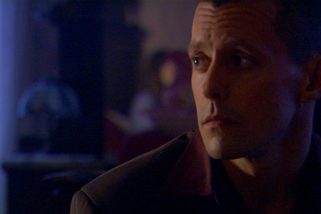This month there is lesbian intrigue in print — the fine mystery “Blind Faith” by Diane and Jacob Anderson-Minshall and the disappointing thriller “X” by JD Glass. In addition, on DVD, there are a pair of gay thrillers — the fantastic H.P. Lovecraft-inspired “Cthulhu” and the execrable reworking of Edgar Allen Poe’s “The Raven” by David DeCoteau.
Blind private detective Yoshi Yakamota gets a curious case when a young lesbian named Aneko hires her agency to find her missing sister Saya in “Blind Faith,” the third in the Blind Eye Detective Series mysteries.
Saya “disappeared” from the Pioneer Institute, a faith-based center that uses aversion therapy to turn queer teens straight. While Aneko hopes that Saya is safe and alive, two other girls from the Institute end up dead. To find out what is going on, Tucker Shade, Yoshi’s PI-in-training, goes undercover at the Institute and uncovers a dastardly plot.
As one character in “Blind Faith” acknowledges, the story has “a gay elder sister, a missing queer teen and an ex-gay cult … all the makings of a lesbian mystery novel.” And it’s a pretty good one at that. The authors, a husband-and-wife writing team, make their points about the insidious nature of trying to forcibly alter one’s sexuality plainly, if not especially subtly. They also have a sense of humor, naming a detective character Dakota Manning and another woman Barbara Parkins (any similarity to the “Valley of the Dolls” actress is purely intentional).
Yet “Blind Faith” keeps readers engaged as various characters reveal their surprising agendas. And although Yoshi becomes quite close with her client, the story’s romantic angles are played down in favor of the thriller elements. As Tucker struggles with proving her value to the agency, she also wrestles with her feelings for the folks she meets at the Institute. It is a strength of the novel that Tucker’s sleuthing provides her with challenges of both heart and mind.
“Blind Faith” may be an obvious “whodunit” but its messages about tolerance and respect are equally clear.
A story of corporate espionage, assumed identities and a plot for world domination featuring two tough lesbian characters, “X” should be a page-turner. Alas, Glass’ novel is mostly a plodding bore. Although the story — about various characters with secret agendas — is complex, it does not take long to get up to speed. The central problem with “X” is that its characters are drawn too simplistically.
Charli is the tough corporate VP who has a quasi-relationship with Anna, who works at her firm. The women have sex, go surfing and maintain “workplace respect and camaraderie” with each other. However, another coworker, Ben, is a computer geek who secretly fancies and admires Charli. Ben, it turns out, is conspiring with John, an evil mastermind who kidnaps Charli to put his nefarious plan in motion.
It is not much of a spoiler to reveal Anna is an undercover Treasury agent who tries to rescue Charli for both personal and professional reasons. She even gets to use her surfing skills in her attempt to save her. Alas, these scenes, like much of “X,” never generate any excitement.
Glass may present a laudable feminist message by having the book’s heroines challenge stereotypes in the fields of business and government. Their ethics, which involve combating sexism in all forms, are the book’s only salient feature. Yet when a character reveals that her uncle abused her “to save her from being a total dyke” or a male character believes that all women want him sexually, it’s a reductive explanation for the characters’ behavior. Had Glass injected a little more complexity into her characters, “X” might have had the X-factor it desperately needs.
Inspired by the H.P. Lovecraft story “The Call of Cthulhu,” director Dan Gildark’s goosebump-inducing thriller features Russell (Jason Cottle), a gay history professor coming home to the island of Rivermouth for his mother’s funeral. He encounters a series of bizarre characters and situations — all of which conspire to keep him on the island — and finds himself in possession of a mysterious object. Trying to make sense of things, Russ reconnects with his sexy-but-straight buddy Mike (Scott Patrick Green), whom he is crushed on, and he meets Susan (Tori Spelling), who wants his sperm. But it is not until a creepily effective encounter with a late-night liquor-store cashier that “Cthulhu” starts getting really weird and scary.
Gildark creates a vivid dystopia that is eerie and compelling, even though he sometimes resorts to some predictable horror-movie “Boo!” moments to ratchet up the tension. “Cthulhu” boasts some unnerving sequences — particularly one in which Russ encounters a missing boy who leads him to a shocking discovery — but the point that Russ’ homosexuality is something worth persecuting him for is perhaps as unsettling.
Cottle’s fierce performance is riveting throughout, and he is especially good at becoming unglued. However, if Gildark’s surrealist touches lend the film an appropriate haunting/otherworldly quality, “Cthulhu” builds inexorably to a rather limp conclusion. Still, the final frame is a corker.
In contrast, DeCoteau’s gay re-imagining of the Edgar Allen Poe classic poem “The Raven” is terrible. Neither as strong nor as suspenseful as his previous effort, “House of Usher,” this film’s only salient feature is the slow-motion sex scenes of gay guys coupling in their undies.
Roderick (Rick Armando) is hosting a masquerade ball at a mansion that was the site of a massacre 50 years earlier. An unhappy someone is dressing up in a raven costume and dispatching the partygoers to a screechy soundtrack. Maybe it is the lone survivor of the massacre? Then again, it could be Roderick’s prep-school rival — and former lover — exacting a long-awaited revenge.
Alas, viewers will care more about the shirtless hunks spilling champagne on each other than whodunit. This “Raven” is hardly campy fun; it’s a dull mystery that generates few thrills — sexually or otherwise.
Maybe DeCoteau should have heeded Poe’s words more closely: nevermore.
